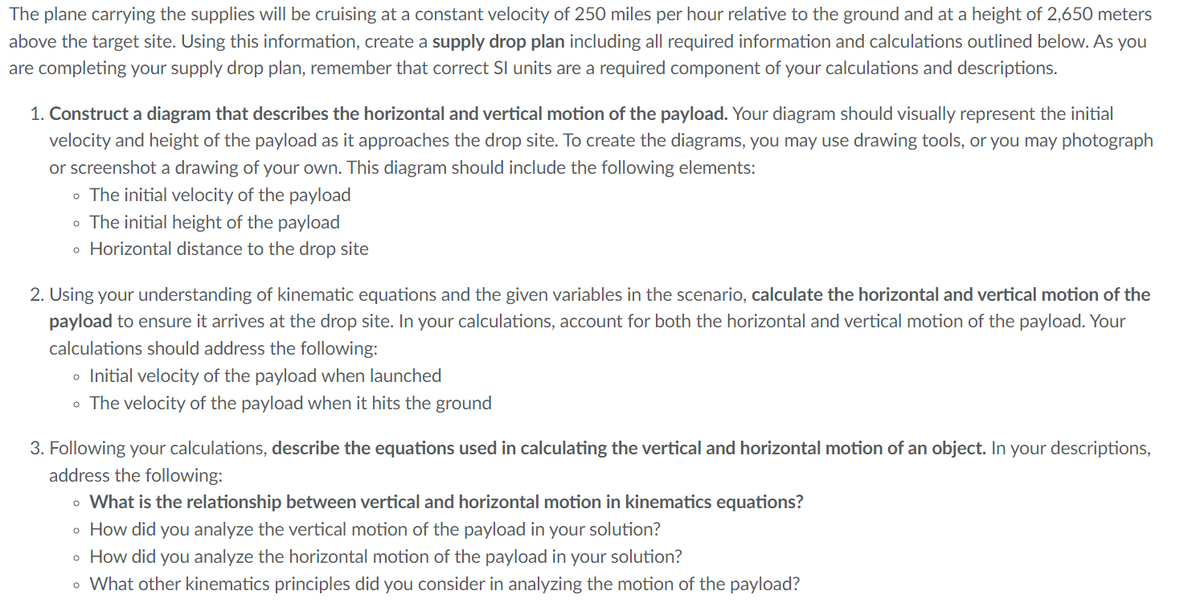The plane carrying the supplies will be cruising at a constant velocity of 250 miles per hour relative to the ground and at a height of 2,650 meters above the target site. Using this information, create a supply drop plan including all required information and calculations outlined below. As you are completing your supply drop plan, remember that correct SI units are a required component of your calculations and descriptions. 1. Construct a diagram that describes the horizontal and vertical motion of the payload. Your diagram should visually represent the initial velocity and height of the payload as it approaches the drop site. To create the diagrams, you may use drawing tools, or you may photograph or screenshot a drawing of your own. This diagram should include the following elements: • The initial velocity of the payload • The initial height of the payload • Horizontal distance to the drop site 2. Using your understanding of kinematic equations and the given variables in the scenario, calculate the horizontal and vertical motion of the payload to ensure it arrives at the drop site. In your calculations, account for both the horizontal and vertical motion of the payload. Your calculations should address the following: • Initial velocity of the payload when launched • The velocity of the payload when it hits the ground 3. Following your calculations, describe the equations used in calculating the vertical and horizontal motion of an object. In your descriptions, address the following: • What is the relationship between vertical and horizontal motion in kinematics equations? • How did you analyze the vertical motion of the payload in your solution? • How did you analyze the horizontal motion of the payload in your solution? • What other kinematics principles did you consider in analyzing the motion of the payload?
The plane carrying the supplies will be cruising at a constant velocity of 250 miles per hour relative to the ground and at a height of 2,650 meters above the target site. Using this information, create a supply drop plan including all required information and calculations outlined below. As you are completing your supply drop plan, remember that correct SI units are a required component of your calculations and descriptions. 1. Construct a diagram that describes the horizontal and vertical motion of the payload. Your diagram should visually represent the initial velocity and height of the payload as it approaches the drop site. To create the diagrams, you may use drawing tools, or you may photograph or screenshot a drawing of your own. This diagram should include the following elements: • The initial velocity of the payload • The initial height of the payload • Horizontal distance to the drop site 2. Using your understanding of kinematic equations and the given variables in the scenario, calculate the horizontal and vertical motion of the payload to ensure it arrives at the drop site. In your calculations, account for both the horizontal and vertical motion of the payload. Your calculations should address the following: • Initial velocity of the payload when launched • The velocity of the payload when it hits the ground 3. Following your calculations, describe the equations used in calculating the vertical and horizontal motion of an object. In your descriptions, address the following: • What is the relationship between vertical and horizontal motion in kinematics equations? • How did you analyze the vertical motion of the payload in your solution? • How did you analyze the horizontal motion of the payload in your solution? • What other kinematics principles did you consider in analyzing the motion of the payload?
Related questions
Question
100%

Transcribed Image Text:The plane carrying the supplies will be cruising at a constant velocity of 250 miles per hour relative to the ground and at a height of 2,650 meters
above the target site. Using this information, create a supply drop plan including all required information and calculations outlined below. As you
are completing your supply drop plan, remember that correct SI units are a required component of your calculations and descriptions.
1. Construct a diagram that describes the horizontal and vertical motion of the payload. Your diagram should visually represent the initial
velocity and height of the payload as it approaches the drop site. To create the diagrams, you may use drawing tools, or you may photograph
or screenshot a drawing of your own. This diagram should include the following elements:
• The initial velocity of the payload
• The initial height of the payload
• Horizontal distance to the drop site
2. Using your understanding of kinematic equations and the given variables in the scenario, calculate the horizontal and vertical motion of the
payload to ensure it arrives at the drop site. In your calculations, account for both the horizontal and vertical motion of the payload. Your
calculations should address the following:
Initial velocity of the payload when launched
• The velocity of the payload when it hits the ground
O
3. Following your calculations, describe the equations used in calculating the vertical and horizontal motion of an object. In your descriptions,
address the following:
• What is the relationship between vertical and horizontal motion in kinematics equations?
• How did you analyze the vertical motion of the payload in your solution?
How did you analyze the horizontal motion of the payload in your solution?
• What other kinematics principles did you consider in analyzing the motion of the payload?
O
Expert Solution
This question has been solved!
Explore an expertly crafted, step-by-step solution for a thorough understanding of key concepts.
This is a popular solution!
Trending now
This is a popular solution!
Step by step
Solved in 4 steps with 1 images
